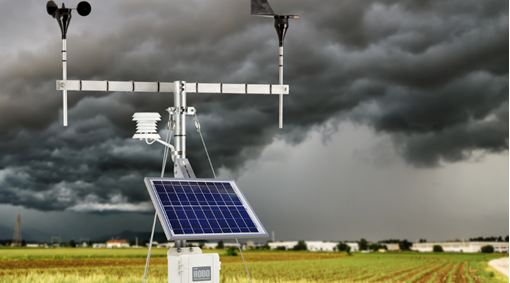The Ultimate Customer's Overview to Weather Stations: What You Required to Know
Wiki Article
Exploring the Different Sorts Of Specialist Weather Condition Terminals for Accurate Data Collection
When it comes to choosing the suitable weather station for data collection, the market provides a variety of choices customized to different needs and setups. Allow's explore the nuances of these professional weather condition terminals to realize their distinct functionalities and figure out the ideal fit for specific data collection demands.Digital Weather Terminals
In the world of meteorological instrumentation, electronic weather condition stations stick out as innovative devices for accurate data collection and analysis. These innovative terminals are furnished with sensing units that record a variety of climate criteria such as temperature level, humidity, barometric pressure, wind rate, and direction. The information gathered by electronic weather stations is transmitted wirelessly to a central console or a computer system for real-time surveillance and analysis.One of the essential benefits of electronic weather condition stations is their capacity to supply high-resolution information with accuracy and dependability. This degree of precision is vital for numerous applications, consisting of farming, emergency, aviation, and research study response. In addition, digital weather terminals typically include software that allows customers to envision the information in various formats like graphes and charts, promoting much easier analysis and decision-making.
Wireless Climate Stations
Structure on the abilities of electronic weather terminals, wireless weather stations offer improved comfort and flexibility in information transmission and surveillance. By utilizing wireless modern technology, these weather condition terminals eliminate the demand for troublesome wired connections, allowing for very easy installation in numerous areas. The cordless feature makes it possible for real-time information tracking from remote areas, giving meteorologists and climate fanatics with instantaneous access to critical info.Wireless weather terminals normally include sensing units that gather information on temperature, humidity, barometric stress, wind rate, and direction. These sensors wirelessly send the data to a central console or receiver, where it is processed and presented for evaluation. Some progressed cordless climate stations can even attach to the web, allowing customers to access their weather condition data from another location via computer systems or mobile phones.

Prosumer Weather Stations
What differentiates Prosumer Weather Stations from conventional consumer-grade climate stations? Prosumer Weather Stations bridge the space in between professional-grade and consumer-grade equipment, using advanced functions and greater accuracy than typical home weather stations. These terminals are developed for weather condition enthusiasts, amateur meteorologists, and tiny companies that require more exact data than what customer versions can provide.Prosumer Weather condition Stations frequently include a larger range of sensing units to gauge extra atmospheric specifications such as UV index, fallen leave wetness, and soil wetness. They also often tend to have a greater level of durability and reliability, making them appropriate for long-term exterior use in different environmental conditions.


Industrial Climate Terminals
Industrial Weather condition Stations, also recognized as meteorological tracking systems, are specialized tools designed for robust and precise weather condition information collection in industrial setups. These stations are customized to fulfill the one-of-a-kind demands of commercial procedures where accurate weather information is critical for security, performance, and decision-making procedures.Industrial weather stations are furnished with advanced sensors that can determine a large range of atmospheric parameters such as temperature, moisture, wind speed and direction, barometric pressure, and precipitation (Weather Stations). These stations are frequently ruggedly developed to withstand rough ecological conditions typically located in commercial environments
One key function of industrial weather condition terminals is their ability to offer real-time data surveillance and evaluation. This allows commercial facilities to anticipate weather-related dangers, enhance operations based on weather, and make sure the safety of employees and devices. In addition, commercial weather condition terminals can be integrated right into existing industrial control systems for seamless data administration and automation.
Portable Weather Stations
As opposed to fixed commercial climate terminals, portable weather stations supply adaptability and wheelchair for on-the-go data collection in numerous ecological settings. These small units are designed to be conveniently moved to various places, making them ideal for field study, emergency situation action scenarios, agriculture, construction websites, and outside occasions.Portable weather terminals typically consist of sensors for gauging parameters such as temperature, humidity, barometric stress, wind speed, and wind instructions. Some advanced designs may additionally feature added sensors for monitoring rains, solar radiation, and UV degrees. In spite of their tiny size, mobile climate stations are qualified of providing trusted and accurate information equivalent to that of larger, taken care of terminals.
One of the crucial benefits of mobile weather stations is their fast release and ease of their explanation configuration. They can be functional within minutes, enabling fast information collection and evaluation. Additionally, these stations can be configured to send real-time data wirelessly, enabling individuals to check and evaluate ecological problems from another location. Overall, portable weather condition stations are very useful tools for professionals needing mobile, precise, and prompt climate details in diverse settings.
Verdict
In conclusion, specialist weather condition stations come in various kinds such as digital, cordless, prosumer, industrial, and my website portable. By recognizing the differences in between these types of climate stations, individuals can make educated decisions to guarantee they get the most specific and reputable weather condition data for their purposes. Weather condition))))Building on the abilities of digital climate stations, cordless weather terminals offer boosted convenience and adaptability in data transmission and monitoring. Some progressed cordless climate terminals can also link to the internet, allowing individuals to access their weather data from another location through computers or smart devices.
Prosumer Weather Stations bridge the space in between professional-grade and consumer-grade tools, offering more innovative functions and greater precision than common home weather condition terminals. Weather Stations. Overall, portable weather condition terminals are important tools for specialists calling for portable, accurate, and timely climate information in diverse settings
By comprehending the distinctions in between these types of weather stations, individuals can make educated choices to guarantee they obtain the most specific and reputable weather condition information for their functions.
Report this wiki page